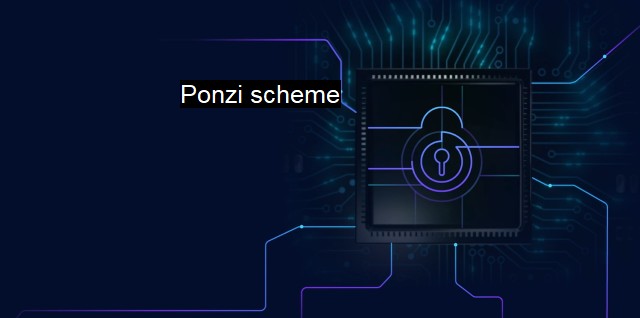What is Ponzi scheme?
Exploring the Perpetual Plague of Ponzi Schemes: Trust-based Fraud in the Digital Era.
A "Ponzi Scheme" is an infamous form of investment fraud, named after the Italian con man Charles Ponzi, who popularized the scheme in the 20th century. This systematic fraud scheme operates by using funds from new investors to pay returns to earlier investors. As attractive as the profitability reports may seem initially, the Ponzi scheme is unsusceptible to last indefinitely. This is because the scheme's operations largely rely on the continuous influx of new investors whose funds serve as an incentive to the existing investors.When the flow of new investors dwindles, the total cash inflows might not be sufficient to pay out previous investors. At this point, it becomes evident that the Ponzi scheme is nothing more than an illusion. When such situations occur, the defrauders often abscond with the remaining funds, leaving the investors high and dry.
In today's advanced digital environment, Ponzi schemes have evolved to take on different forms and utilize new techniques. One of those nuances lies with viruses, and diverse technological threats. Cyber actors might leverage the internet as an influential platform for Ponzi schemes, masking their operations behind the face of legitimate online investment opportunities.
To perpetrate Ponzi schemes cybercriminals often use advanced sophisticated techniques to defraud innocent parties on the internet. Usually, they employ social engineering and phishing emails to manipulate new prospects into investing in their fraudulent ventures. These corruptions are often disguised in various forms, often as quick-return investment opportunities. Mostly, those conducting the fraudulent exercise will promise even more significant returns to those who can attract other investors intensifying the area of effect and the expansion of their malicious circles.
More often than not, digital Ponzi schemes come with infectious malware that can hinder one's cybersecurity efforts drastically. Ranging from spyware, adware, to serious ransomware, the modus operandi of these schemes has gotten more technically complex, and it falls within the scope of a serious cybersecurity dilemma today.
Investors' financial data, among other confidential information, is of enormous interest to these fraudsters. Thus, ensuring digital hygiene is more necessary today than ever before. This is where antivirus tools come into play. These applications serve as the surer method of safeguarding against these digital threats.
A favorable antivirus solution can protect an individual from falling victim to such scams by providing web protection, daily automatic scanning, persistent virus database updates, and by flagging potentially harmful emails or messages. It helps users by playing a defensive role, identifying and eradicating potential threats before they inflict any actual harm.
An antivirus tool alone will not completely shield one from falling prey to such schemes. knowledge and awareness of potential threats are equally as vital as technical safety measures. Therefore, it is crucial to stay informed about Ponzi schemes, their characteristics, and learn how to spot and avoid them. Do not be seduced by “too good to be true” investment opportunities and reliable antivirus systems should be able to detect suspicious content.
Ponzi schemes, in the current era, heavily arm themselves with complicated digital tools and sophisticated techniques to defraud a class of internet users. While preliminary investment might yield huge returns, the continuity of the pattern is unachievable. This culmination emphasizes the prominence of antivirus solutions and generalized cybersecurity information as essential tools to counteract such threats. Maintaining heightened security awareness, combined with robust antivirus software, is a key strategy to safeguard oneself against any form of investment fraud.

Ponzi scheme FAQs
What is a Ponzi scheme?
A Ponzi scheme is a fraudulent investment scam in which returns are paid to earlier investors using the investments made by newer investors, rather than from revenue generated by any legitimate business or profit.How do Ponzi schemes relate to cybersecurity?
Ponzi schemes can be conducted online through websites and social media platforms, making them a cybersecurity issue. Cybercriminals can create fake investment opportunities that lure people into putting their money into the scam.Can antivirus software protect against Ponzi schemes?
Antivirus software may not be specifically designed to detect Ponzi schemes, but it can help protect you from phishing emails and malicious websites that could be associated with such schemes. It is important to have up-to-date antivirus software on your devices to protect yourself from various forms of cyber threats.What are some red flags to look out for to avoid falling victim to a Ponzi scheme?
Some red flags to look out for include high investment returns with little or no risk, pressure to invest quickly, promises of guaranteed returns, and a lack of transparency or information about the company or investment opportunity. Always do your research and seek advice from trusted professionals before investing your money.| | A | | | B | | | C | | | D | | | E | | | F | | | G | | | H | | | I | | | J | | | K | | | L | | | M | |
| | N | | | O | | | P | | | Q | | | R | | | S | | | T | | | U | | | V | | | W | | | X | | | Y | | | Z | |
| | 1 | | | 2 | | | 3 | | | 4 | | | 7 | | | 8 | | |||||||